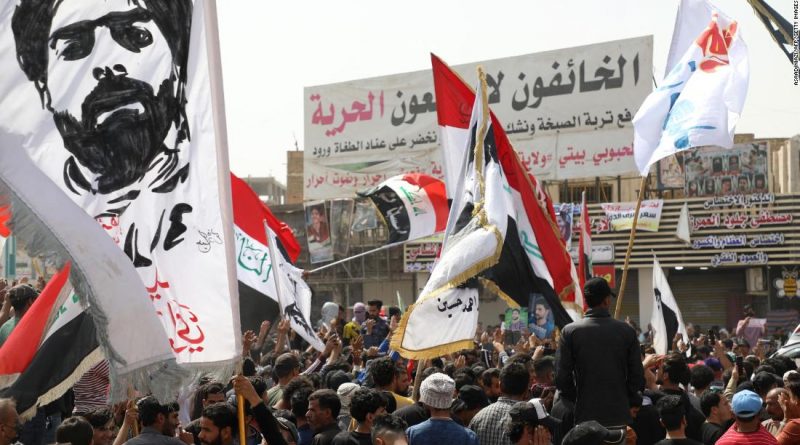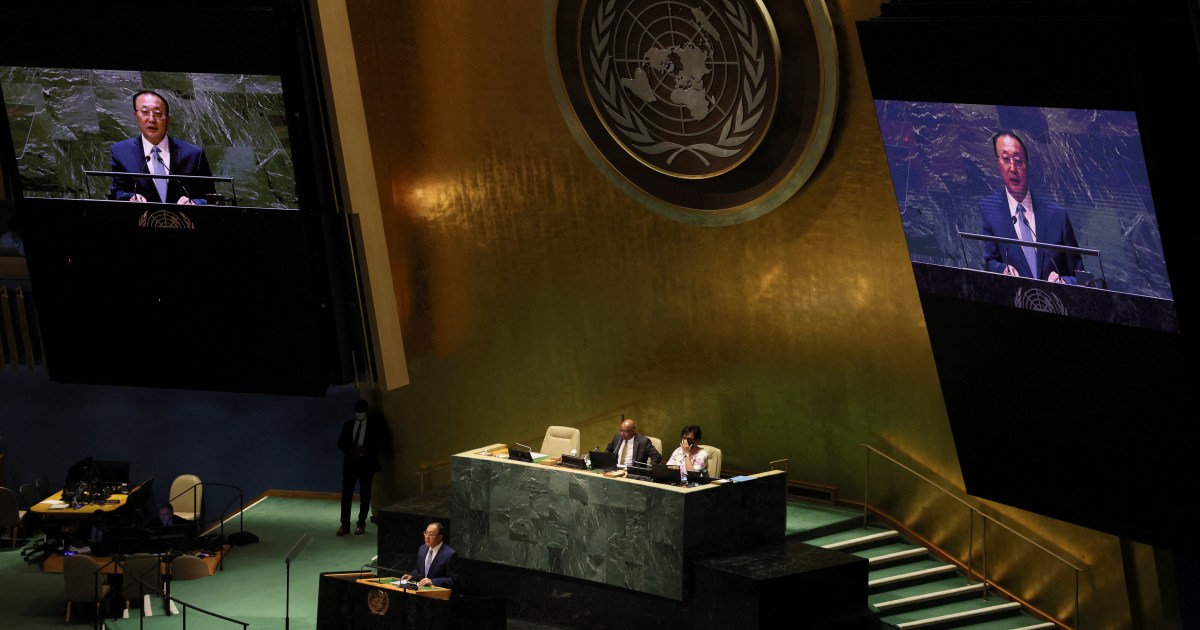Egypt caps bread prices as shockwaves of Ukraine war hit Middle East
“This crisis may be significantly more severe than the coronavirus crisis,” said Egyptian prime minister Mostafa Madbouly during a cabinet meeting Monday, referring to the economic impact of Russia’s war in Ukraine.
Particularly hit are Middle East countries that rely on both Russia and Ukraine, two of the world’s top grain exporters, for the bulk of their grain imports.
For Egypt and other Middle Eastern nations grappling with the ripple effects of the war, that’s a cause for concern. Just 10 years ago, revolutions across the region toppled longtime dictators partly because of a rise in the price of commodities. “Bread, freedom, social justice!” was among the most popular chants on the streets of Egypt during Arab Spring protests.
In the three weeks since Russia’s invasion of Ukraine, the price of unsubsidized bread in Egypt jumped by as much as 25% in some bakeries. Cairo on Monday fixed the price of unsubsidized bread to limit the inflationary impact.
Egypt is the world’s largest buyer of wheat and approximately 80% its wheat imports came from Russia and Ukraine in 2021, according to Reuters.
“Food insecurity absolutely can result in greater political unrest,” Lama Fakih, the Middle East and North Africa director at Human Rights Watch, told CNN. “These are a number of countries that have already been suffering from conflict [and] from political upheavals.”
Discontent has already manifested in the form of a protest in Iraq, where a relatively small March 9 rally in the central city of Nasiriyah against a rise in food prices was attributed by the government to the Ukraine war. The government later announced a support package for citizens which included one-time grants to those in need and reviewing the ration card budget ahead of the Muslim fasting month of Ramadan.
“We are nearing the month of Ramadan and are worried about price increases,” said Mohamed Ali, a 42-year-old Iraqi day laborer living in Baghdad. “There is an increase in most food prices, especially cooking oil.”
Much of the region had already been suffering from poverty and food insecurity, but the war in Europe is only aggravating the situation, said Timothy Kaldas, a fellow at Cairo’s Tahrir Institute for Middle East Policy.
“The 2011 [Egyptian] uprising came after a decade of rising levels of poverty,” Kaldas told CNN. “And in 2019 when Egyptians protested in multiple cities across the country, the regime found that the people they arrested… were primarily driven by economic grievances.”
On Monday, the Egyptian pound dropped 14% against the dollar after Russia’s invasion of Ukraine prompted foreign investors to pull billions of dollars out of Egyptian treasury markets. The central bank also spiked overnight interest rates by one percentage point and the government announced a 130 billion Egyptian pound ($7.05 billion) economic relief package.
“Countries that are already suffering from widespread food insecurity are the ones that have been hardest hit,” said Fakih, “And these include Yemen, Lebanon, and Syria.”
Lebanon last month said it had wheat reserves sufficient for only one month. It imports nearly 60% of its wheat from Ukraine.
Hend Zaki, a 38-year-old Egyptian mother-of-five who runs a food business from home, said she has lost clients since she raised her meal prices two weeks ago.
“I practically pay double now for everything,” she told CNN. “We are greatly harmed … there are some very poor people [here].”
With additional reporting from Adam Pourahmadi and Aqeel Najim, CNN
Other top Middle East news
Egypt, Israel and the UAE leaders hold trilateral talks amid Iran concerns
Israeli Prime Minister Naftali Bennett and Abu Dhabi Crown Prince Sheikh Mohammed bin Zayed met with Egyptian President Abdel Fattah el-Sisi on Monday, official reports said on Tuesday. The meeting focused on global developments “especially regarding energy, market stability and food security,” Egypt said.
- Background: The meeting in Egypt comes just days after Syrian President Bashar al-Assad made a landmark trip to the UAE, his first to an Arab nation since the start of the Syrian uprising in 2011. It also comes as nuclear talks between Western powers and Iran reach an advanced stage.
- Why it matters: Israel has repeatedly expressed concern over Iran’s growing influence in the region. In recent days, Bennett said he is “very concerned” that the US is considering removing Iran’s Revolutionary Guards from its terrorism blacklist. The State Department has not confirmed its intentions to do so.
Judge charges Lebanon’s central bank governor with illicit enrichment
Lebanese central bank governor Riad Salameh and his brother Raja were charged with illicit enrichment on Monday, Lebanese Judge Ghada Aoun told CNN. She ordered Raja’s detention on Thursday “for the role he played in helping Riad to launder money through purchasing property in France,” she said. The governor did not respond to CNN’s request for a comment, but in a previous statement acquired by Reuters, Governor Salameh said “not a single penny” was used from public funds to pay fees to a company owned by his brother. Last week, Raja Salameh’s lawyer said allegations of illicit enrichment and money laundering against his client were unfounded. He called the evidence “media speculation without any evidence,” reported Reuters. CNN wasn’t able to reach Raja Salameh.
- Background: Salameh’s tenure has faced increased scrutiny since the financial system imploded in 2019, the most destabilizing crisis since Lebanon’s 1975-90 civil war. In February, Judge Aoun issued a subpoena for him after he failed to attend three hearings as a witness in investigations into his alleged misconduct at the central bank. Reuters reports that court security was unable to locate him.
- Why it matters: This is the first charge brought against the governor who has held his position for almost 30 years. His wealth is also being investigated by authorities in France and Switzerland. The charge may exacerbate political tensions between Salameh’s powerful backers and opponents.
Saudi Arabia emphasizes ‘essential role’ of OPEC+ oil accord
Saudi Arabia’s cabinet emphasized on Tuesday “the essential role” of the OPEC+ agreement in bringing balance and stability to oil markets.
- Background: Several major consuming nations, including the United States, have called on producers to raise their output at a faster rate to help calm crude oil prices, which have soared on the back of Russia’s invasion of Ukraine. The alliance has been raising output by 400,000 barrels per day each month since August to unwind cuts made when the Covid-19 pandemic hit demand.
- Why it matters: The statement, a little over a week before OPEC+ is scheduled to meet, indicates little chance the grouping will decide to raise oil output at a faster pace. OPEC+, which groups the Organization of Petroleum Exporting Countries and its allies including Russia, has so far resisted calls to increase supply. It will hold its next meeting on March 31.
What we’re watching
The Gulf states’ relations with the US have been under stress of late, most recently being tested when the Biden administration requested asked Saudi Arabia and the UAE to help reduce oil prices by ramping up production. That request was rebuffed. Becky Anderson dissects the fissure between the allies.
Around the region
Meet Stan, the world’s most complete and most expensive tyrannosaurus rex. Named after the paleontologist who unearthed him, the 67-million-year-old artifact was excavated in 1992. With
188 bones, it is one of the best-preserved and most studied T-Rex skeletons. For years, it remained behind closed doors at the Black Hills Institute of Geological Research in Hill City,
South Dakota. But now, it has a new home.
In 2020, the 11-meter-long and 4-meter-high T-Rex was auctioned for $31.8 million, setting a world record for any skeleton sale. At first, the buyer was anonymous, but a recent announcement by Abu Dhabi’s Department of Culture and Tourism (DCT) has revealed Stan’s owner and a new development in the region: the Natural History Museum Abu Dhabi.
Set to open in 2025, the museum is a part of the city’s plan to transform Abu Dhabi into an international cultural hub. Chairman of DCT Abu Dhabi, Mohamed Khalifa Al Mubarak, told
CNN’s Becky Anderson why Stan was worth every penny: “It’s going to be worth everything when visitors come and just look up at this amazing specimen … the last thing we want is these amazing objects to be sitting in private hands for nobody to view.”
Stan is well known in paleontology circles. Now, his presence is set to be a part of the Natural History Museum’s 13.8-billion-year journey through time and space. The T-Rex is set to showcase alongside other specimens, including the 7-billion-year-old Murchison Meteorite, which crash-landed in Australia more than 40 years ago.
By Tasmiyah Randeree, CNN




